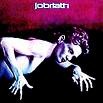Jobriath: Jobriath & Creatures of the Street (Collector's Choice)
Jobriath set out to be a star of stratospheric proportions; what he became, if he was remembered at all, was the leper boy of Glam. Excluded from features and books on the subject, he was written off, and written out of, the picture. The Bowie clone and wannabe, a parable of hype over content, he fell beneath the radar of the taste-makers and shakers. Maligned and marginalized, he died in obscurity; the man who never came back, but the one who sang in supper clubs in Manhattan for out-of-town tourists. A record industry joke that wasn't all that funny.
Morrissey set out to find the long lost Jobriath Boone -- who imperiously retired when all had failed in the fall of '74 -- for the support slot on his Your Arsenal tour, only to get nowhere. Jobriath's AIDS-related death at age 36 in 1983 at the Hotel Chelsea had failed to merit a mention. Most people who knew of Cole Berlin, the lounge pianist and occasional prostitute, had no idea that he had once been Jobriath, "the true fairy of rock and roll." The problem with Jobriath was attitude and timing. His manager's, and his own. He arrived too late to be a glitter messiah. Trying to make a splash that would render the world speechless with appreciation, he only succeeded in creating a tidal wave of disdain and revulsion that obliterated any hope for his name in lights. Journalists dislike being told how good an act is; they prefer to divine that for themselves, and therefore their readers. By making a candid issue of his sexuality, Jobriath was viewed by a largely straight music press as a nuisance upstart who should be silenced. The NME declared him "the fag-end of Glam Rock," and more liberal types saw his excessive mentions of his sexuality as bordering on the homophobic, the gay as uber-freak. His manager, Jerry Brandt, couldn't stop talking up his commodity, who would stage extravaganzas in opera houses to startle everyone. He would be bigger than Garbo, Elvis, or the Beatles. He would conquer the world. Brandt had tasted success with Carly Simon, but with Jobriath his tongue got used to the bitter flavors of failure.
Jobriath had been in the original cast of Hair and had briefly fronted Pidgeon, a rather lackluster hippie rock band who recorded one album and single for U.S. Decca. His 1971 demo, about to be rejected by Columbia Records supremo Clive Davis as being "mad unstructured and dangerous to melody," was overheard by Brandt, who sought out the virtually down-and-out hustler and signed him. Jobriath later pithily remarked that Davis's critique was ironic coming from the man who'd discovered both Patti Smith and Barry Manilow. Brandt and he were an unusual pairing, and a disastrous one, but Jobriath would pay a heavier price for his tango with fate. Brandt merely dusted himself off and went on as a promoter; Jobriath, battered and bowed, fell like a glittering Icarus into the sea of forgotten ideals.
A few years back, Morrissey compiled Lonely Planet Boy as a tribute to Jobriath on his Attack label. It was a lavish sampler, a fitting reader for a largely uninitiated world. Now Collector's Choice releases the two studio albums in their entirety, and finally Jobriath hits the streets in a different century, one that is more tolerant of troublesome eccentrics. The hype has long since evaporated into the thin air from which it had evolved, and most of the unsympathetic hacks from that time have laid down their pens. What emerges is an assured and accomplished songwriter of tremendous aplomb. Songs such as "Inside" and "Morning Starship" are amazingly focused confections. Like him or loathe him, work like this cannot be swept aside with a dismissive sentence. 
However, Creatures of the Street remains a more eclectic affair. It is a truncated concept album which is somewhat incomplete. Symphonic interludes recorded in London betray the scope and ambition of the projected stage show. It was released as a stopgap that might halt the shit flying from the fan. Despite songs such as "Ecubyan" and "Scumbag" that reveal a startling eloquence and verve, it didn't, and betrays the fact that it was cobbled together from the same sessions as the debut album. It hadn't been long released before Elektra dropped him, and Jerry Brandt abandoned any involvement in the proceedings. Attempts at a third album resulted in little more than demos and were never completed. Both albums are flawlessly executed. Produced by former Hendrix associate Eddie Kramer, they stand the test of time as classy and defiant artifacts from a more polarized era. It matters less that Jobriath was gay, but it mattered tremendously then, and was one of the chits to cost him his career. He remains a fascinating footnote, a maverick with painted toenails. The original who became a facsimile, a scapegoat for his manager's excessive claims, and his own inability to reign in his troublesome ego. He deserves a belated listen. Certainly there are elements of Bowie, but that is the easy way out, and after all these years the individual quality shines through. He was a creature of the street; perhaps now he may from the gutter see the night of stars.

